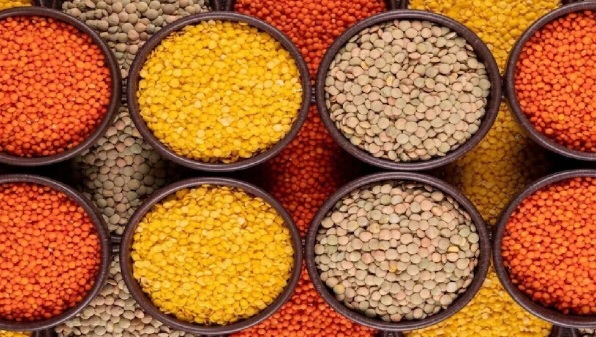Why in Discussion ?
- On 1st October 2025, the Union Cabinet approved a six-year program called the “Mission for Aatmanirbharta in Pulses 2025.”
- Program Duration: 2025-26 to 2030-31
- Financial Allocation: ₹11,440 crore
- Objectives: Increase domestic pulse production to 35 million tonnes, reduce import dependence, and ensure income for approximately 2 crore farmers.
- India is the largest producer and consumer of pulses globally, yet it still relies on imports for 15-20% of domestic demand.
- The mission aims to bridge this gap and strengthen rural livelihoods.

Mission Objectives and Targets
By 2030-31, key targets include:
- Increase pulse cultivation area to 31 million hectares.
- Improve productivity to 1,130 kg/hectare.
- Achieve production of 35 million tonnes.
- Reach interventions to around 2 crore farmers.
Key Features and Strategic Components
(i) High-Quality Seeds and Research
- 88 lakh free seed kits to be distributed under the mission.
- Seeds will be high-yielding, pest-resistant, and climate-resilient.
- 126 lakh quintals of certified seeds to cover 37 million hectares.
- States will develop five-year rolling seed production plans.
- A partner portal will monitor seed quality and distribution.
(ii) Area Expansion and Crop Diversification
- Rice fallow lands and underutilized areas will be brought under pulse cultivation covering 3.5 million hectares.
- Promote intercropping and crop diversification based on regional agro-climatic conditions.
- Convergence with existing programs such as the Soil Health Program and Agricultural Mechanization Sub-Mission.
(iii) Infrastructure and Post-Harvest Management
- 1,000 pulse processing and packaging units to be set up.
- Subsidy of up to ₹25 lakh per unit.
- Objectives: Improve storage, reduce post-harvest losses, and increase farmers’ income.
(iv) Cluster-Based Implementation
- Interventions based on regional requirements.
- Efficient resource allocation and adoption of location-specific varieties.
- Strengthen local market linkages.
(v) Procurement and Market Stability
- Under the Price Support Scheme (PSP), 100% procurement of Tur, Urad, and Masoor for the next four years.
- Registered farmers benefit from MSP protection.
- Implementation through NAFED and NCCF.
- Price monitoring mechanisms to build farmer confidence.
Importance of the Mission
- Reduce imports and save foreign exchange: Less dependency on imports.
- Increase farmers’ income: Through improved seeds, MSP, infrastructure, and reduced post-harvest losses.
- Nutrition and food security: Pulses are a major source of protein and micronutrients.
- Environmental and climate benefits: Nitrogen fixation improves soil fertility; water-efficient and climate-resilient crops.
Challenges
- Slow adoption of new varieties without strong extension support.
- Establishing rural seed distribution and processing units.
- Sustaining procurement efforts beyond the four-year assurance period.
- Ensuring monitoring and evaluation so that funds and resources reach targeted beneficiaries.
Key Facts
- India: Largest producer, consumer, and importer of pulses in the world.
- Major pulse crops: Tur (pigeon pea), Urad (black gram), Masoor (lentil), Moong (green gram), Chickpea.
- Top producer state: Madhya Pradesh.
- Key institutions and programs:
- ICAR – Indian Council of Agricultural Research (1929)
- NAFED – National Agricultural Cooperative Marketing Federation of India Ltd (1958), CAACP
- PM-AYUSHMAN ASHA (2018)
- Soil Health Card Scheme (2015)
|
Question: What is the duration of the “Aatmanirbharta in Pulses” ?
(a) 2023-2028
(b) 2025-2031
(c) 2024-2030
(d) 2026-2032
|



